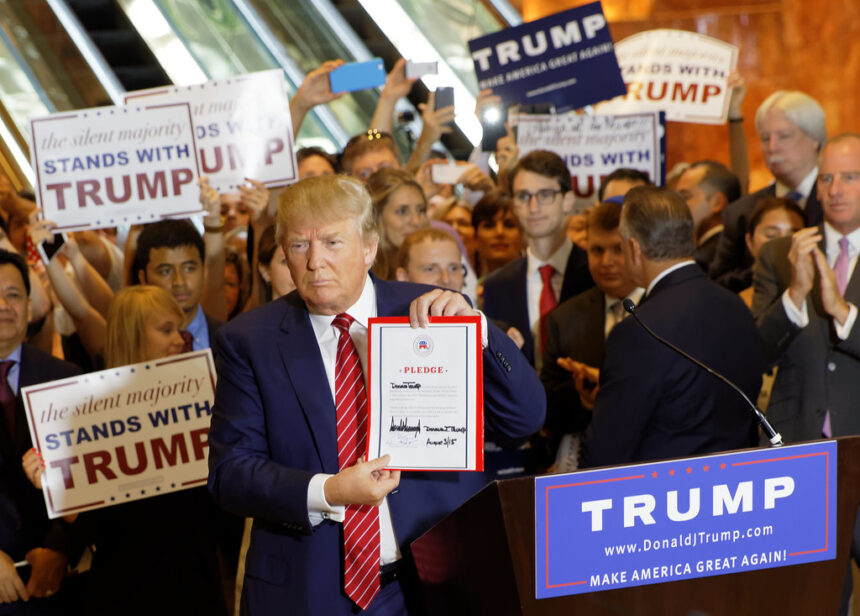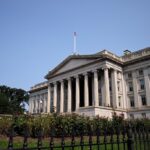Top administration officials believe that the recently announced suspension of steep US tariffs on certain Chinese electronic products, such as smartphones and laptops is only a temporary respite.
The former president Donald Trump has made it clear that trade pressures are not confined to these important technology sectors. He also promised further actions amid the economic tension between Washington and Beijing.
On Friday, the White House appeared to have extended an olive branch by excluding from reciprocal tariffs against China a number of electronic products that are popular.
Wall Street was initially optimistic about the market’s recovery.
Following the announcement that import tariffs for Apple, Nvidia and other tech giants will be removed for 90 days, shares of these companies were expected to rise.
The relief was short-lived. On Sunday, however, the message of the administration had changed dramatically. It reaffirmed a hardline position.
Trump vows new tariff scrutiny
Donald Trump addressed directly the issue of the exemption in a typical social media post. He was trying to change the narrative.
Trump said on Sunday that there was “no tariff ‘exception.'”
The existing Fentanyl tariffs of 20% will continue to apply to these products. They are simply moving into a new Tariff “bucket.”
Trump promised a larger trade offensive, beyond clarifying that the exemption was temporary.
He revealed plans to launch a trade investigation aimed at the semiconductor industry, and more generally, “the entire electronics supply chain”.
He added that his reasoning was consistent with the focus of his administration on economic nationalism. “We won’t be held hostage, by any other Country. Especially hostile trading nations like China,” he said.
New tariffs for essential tech: a new ‘Made in America” push?
Howard Lutnick, the Commerce Secretary, confirmed Trump’s statements by confirming that electronic products excluded from the tariff will be subject to new, different duties in the future.
Lutnick, in a Sunday speech, detailed his plans to implement “a special-focus tariff,” which would target smartphones, computers and other electronic devices. He said that he expected the new tariffs within “a few months.”
He explained that these measures would operate in parallel with distinct tariffs targeting semiconductors and drugs, outside of the larger reciprocal tariffs against China.
Lutnick explained in an ABC Interview that “he’s saying [the semiconductors] are exempt from reciprocal tariffs but included in the tariffs on semiconductors which will be coming probably in a few months or so.” Lutnick explicitly tied this strategy to concerns about national security and his goal of returning manufacturing back home.
He predicted that the levies will encourage domestic production.
Markets are roiled by policy whiplash, which fuels concerns about the economy
The latest development in the US-China Trade Conflict under Trump is characterized by an escalating threat and an abrupt shift of policy.
In a tit for tat game, US tariffs on Chinese imports (reportedly reaching up to 145% at times) have been matched by Beijing with a 125% tax on US goods. This has created a climate where the two world’s largest economies are constantly on edge.
Financial markets have been impacted by the constant back and forth. Trump’s initial tariff announcements and subsequent reversals are blamed for the worst volatility seen on Wall Street in the past two years, since the Covid Pandemic.
Standard & Poor’s 500 has fallen by more than 10% since Trump took office in January.
The pauses that followed tariff declarations have caused shockwaves. They’ve led to investor fleeing government bonds and a dollar devaluation.
Economists have continued to say that broad-based tariff policies could hinder economic growth or even cause inflation.
China’s cancellation of the Olympics is met with criticism
Administration’s strategy continues to be criticized. Elizabeth Warren, a Democratic senator from Massachusetts who appeared on ABC’s “This Week” before Trump posted his Sunday social media message, slammed Trump for not having a tariff policy.
Beijing has reacted with caution to the original announcement of Friday’s exemption.
China’s Commerce Ministry described this move as “a small one” and reiterated its call for the Trump Administration to “fully cancel” their entire tariff policy.
China is actively working to strengthen relationships with other countries, despite the escalating tensions in the trade war. President Xi Jinping will visit Vietnam Monday, as part of a Southeast Asia tour, and this signals a pivot to regional partners.
Uncertainty surrounding US trade policies, especially towards China’s crucial tech sector, remains an important feature of global economy.
The post US Prez Donald Trump: Smartphone tariff relief is temporary; new duties are coming, may be updated as developments unfold.
This site is for entertainment only. Click here to read more





